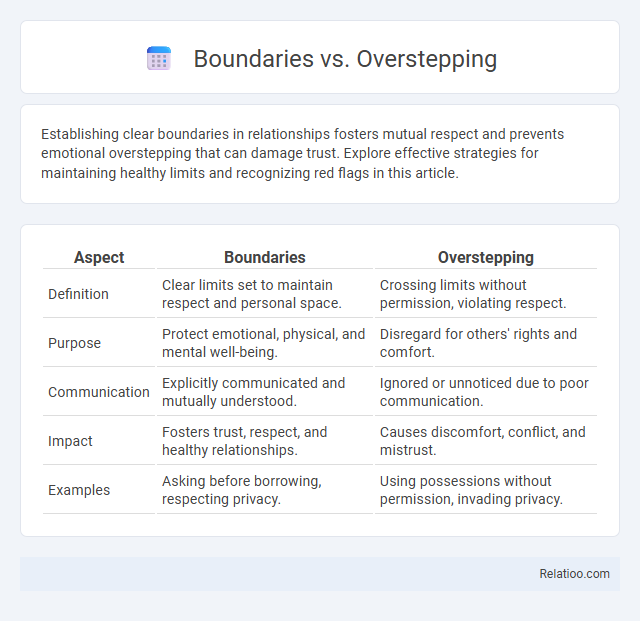Establishing clear boundaries in relationships fosters mutual respect and prevents emotional overstepping that can damage trust. Explore effective strategies for maintaining healthy limits and recognizing red flags in this article.
Table of Comparison
| Aspect | Boundaries | Overstepping |
|---|---|---|
| Definition | Clear limits set to maintain respect and personal space. | Crossing limits without permission, violating respect. |
| Purpose | Protect emotional, physical, and mental well-being. | Disregard for others' rights and comfort. |
| Communication | Explicitly communicated and mutually understood. | Ignored or unnoticed due to poor communication. |
| Impact | Fosters trust, respect, and healthy relationships. | Causes discomfort, conflict, and mistrust. |
| Examples | Asking before borrowing, respecting privacy. | Using possessions without permission, invading privacy. |
Understanding Personal Boundaries
Understanding personal boundaries is crucial for maintaining healthy relationships and ensuring your emotional well-being. Clear boundaries help you recognize when someone is overstepping, which can lead to discomfort or resentment if ignored. Respecting these limits fosters mutual respect and protects your mental and emotional space.
What Does Overstepping Mean?
Overstepping means crossing established personal or social boundaries, often ignoring the limits set by others in communication or behavior. It involves acting beyond what is considered acceptable or respectful, leading to discomfort or conflict in relationships. Recognizing overstepping helps maintain healthy boundaries and mutual respect.
Types of Boundaries: Physical, Emotional, and Digital
Your personal boundaries encompass physical space, emotional feelings, and digital interactions, each requiring clear limits to maintain respect and well-being. Physical boundaries protect your personal space and physical comfort, while emotional boundaries guard your feelings and mental health from intrusion or manipulation. Digital boundaries regulate your online presence and privacy, ensuring your information and interactions remain secure and controlled.
Signs Your Boundaries Are Being Overstepped
Signs your boundaries are being overstepped include feelings of discomfort, resentment, or anxiety when others disregard your limits. Frequent interruptions, unsolicited advice, and invasion of personal space often indicate boundary violations. Recognizing these signals early helps maintain healthy relationships and self-respect.
Why Setting Boundaries Matters
Setting boundaries is essential for maintaining healthy relationships and protecting your emotional well-being, as it clearly defines your limits and expectations. Overstepping occurs when someone disregards these limits, leading to discomfort, resentment, or conflict. Establishing and communicating boundaries empowers you to create respect and trust, reducing the likelihood of emotional harm or misunderstandings.
Common Reasons People Overstep
Common reasons people overstep boundaries include a lack of awareness about personal limits, misunderstandings in communication, and a desire for control or influence over others. Emotional needs such as seeking validation, insecurity, or fear of rejection often drive boundary violations. Social dynamics and cultural differences also contribute to how individuals perceive and respect boundaries in relationships and interactions.
Ways to Communicate Your Boundaries Clearly
Clear communication of your boundaries involves using assertive language and specific examples to express your limits respectfully. You can say what you are comfortable with and what actions you consider overstepping, ensuring the listener understands your expectations. Maintaining consistency in enforcing these boundaries reinforces your message and prevents misunderstandings.
The Impact of Overstepping on Relationships
Overstepping boundaries in relationships disrupts trust and creates emotional distance, often leading to resentment and conflict. Respecting personal limits fosters healthy communication, while disregarding these boundaries can trigger feelings of betrayal and undermine mutual respect. Consistent overstepping erodes the foundation of relationships, making reconciliation and emotional intimacy difficult to maintain.
Strategies for Reclaiming Your Boundaries
Reclaiming your boundaries requires clear communication and assertiveness to define limits, emphasizing the importance of saying no without guilt. Identifying patterns of overstepping early enables proactive responses, such as setting firm consequences and reinforcing your right to personal space. Regular self-reflection strengthens boundary awareness, empowering you to maintain healthy relationships and prevent future violations.
Building Healthy, Respectful Interactions
Establishing clear boundaries is essential for building healthy, respectful interactions by defining personal limits and expectations. Overstepping these boundaries often leads to discomfort, conflict, and erosion of trust within relationships. Consistently honoring boundaries fosters mutual respect, effective communication, and emotional safety among individuals.

Infographic: Boundaries vs Overstepping
 relatioo.com
relatioo.com